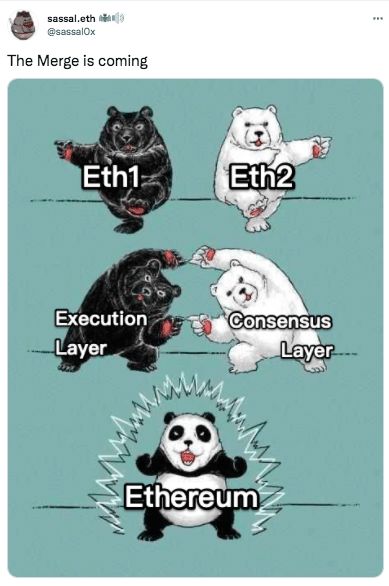October 6, 2021 / Unchained Daily / Laura Shin
Daily Bits ✍️✍️✍️
-
Bitcoin hit $51,000 yesterday, crossing $50,000 for the first time in a month.
-
Sky Mavis, the developer of Axie Infinity, confirmed its new raise, bringing in $152 million at roughly a $3 billion valuation.
-
US Bank, the fifth-largest bank in the US, now offers crypto custody through a partnership with NYDIG.
-
Arca launched a $30 million fund to invest in NFTs.
-
NFT sales hit $10.7 billion in Q3.
-
Lawmakers in Brazil are working on making Bitcoin a legal payment currency.
-
SEC Chair Gary Gensler says the SEC has no plans to ban cryptocurrency.
-
The Block published an article summarizing the latest updates for both the Infrastructure Investment and Jobs Act and the Build Back Better Act — two bills that could have massive implications on how cryptocurrency is regulated in the US.
-
Mirror, an Ethereum publishing tool, just opened its protocol up to anyone.
What Do You Meme?
What’s Poppin’?
1. Hester Peirce’s Safe Harbor Proposal Now Has Legislative Backing
Yesterday, Representative Patrick McHenry, the ranking member of the House Financial Services Committee, proposeda new bill, dubbed the Clarity for Digital Tokens Act of 2021, that seeks to turn SEC Commissioner Hester Peirce’s idea of a “safe harbor” for crypto assets into actual law.
Under the proposed legislation, crypto companies would be allowed to launch a token without worrying about running afoul of US securities law. “My bill, which builds on the great work of SEC Commissioner Hester Pierce, will help provide the necessary legal certainty to digital asset projects when they launch,” McHenry said in a prepared statement.
The bill would give crypto startups three years to mature into a decentralized state. And, after the years, the hope is that the token would no longer be considered a security under federal law. To be considered a safe harbored company, crypto startups would be required to disclose their source code, transaction history, and tokenomics to prospective investors.
2. USDC Comes Under Fire From the SEC
Circle Financial, a key backer of the stablecoin USDC, said in a recent regulatory filing they “received an investigative subpoena from the SEC Enforcement Division requesting documents and information regarding certain of our holdings, customer programs, and operations.” CoinDesk’s Danny Nelson first broke the news.
For its part, Circle says it is “cooperating fully” with the regulator’s investigation,” which has been ongoing since July 2021. The news was initially disclosed in Circle’s August 2021 filing, but went largely unnoticed.
The document that broke the news was an S-4 from Circle, which was issued as part of Circle’s plan to go public. As of press time, Circle has yet to make a public comment on the subpoena.
The subpoena came about one month after Circle launched a crypto yield product for corporations, touting licenses in Bermuda.
Recommended Reads
-
Columbia’s Blockchain group on Axie Infinity:
-
Coin Metrics on the biggest storylines of Q3 in crypto:
-
Punk 6529 on why NFTs change, well, everything:
On The Pod…

How does the SEC determine if a token is a security? Why is DeFi particularly hard to regulate? What will regulators do about stablecoins? On Unchained, Greg Xethalis, chief compliance officer at Multicoin Capital, and Collins Belton, founding partner at Brookwood P.C., dive into crypto regulation, discussing securities laws, DeFi regulation, and why the US should be promoting stablecoins rather than trying to shut them down. Highlights:
-
why the SEC and CFTC have not announced bigger crypto enforcement news at the end of their fiscal years
-
why the SEC is going after DINO (decentralized in name only) companies
-
what the Howey and Reves tests are and how the SEC uses them to determine whether an asset is a security or not
-
why Collins and Greg think the SEC has recently begun been applying Reves more often
-
why they think centralized crypto lending products should not be considered securities under the Howey test
-
whether new legislation needs to be written for cryptocurrency-based products
-
what makes Collins think the SEC is being “disingenuous” regarding the SEC registration process for crypto companies, like Coinbase
-
how regulators will end up handling DeFi and why both Greg and Collins are long-term optimistic
-
how the US government has a “great history” of respecting privacy and encryption
-
why regulatory pressure is likely to build up around centralized crypto exchanges and what we can learn from the EtherDelta case
-
why Collins thinks most cryptocurrency companies should be regulated
-
why the SEC is the best motivator for forcing protocols to fully decentralize
-
how smart contracts could theoretically be used to standardize SEC Commissioner Hester Peirce’s Safe Harbor proposal
-
how blockchain data makes cryptocurrency companies more transparent and easier to regulate than centralized entities
-
what Collins and Greg think will happen with stablecoin regulation going forward
-
why the US should be pushing to make dollar-pegged stablecoins more prominent
Book Update
My book, The Cryptopians: Idealism, Greed, Lies, and the Making of the First Big Cryptocurrency Craze, is now available for pre-order now.
The book, which is all about Ethereum and the 2017 ICO mania, comes out Jan. 18. Pre-order it today!
You can purchase it here: http://bit.ly/cryptopians




